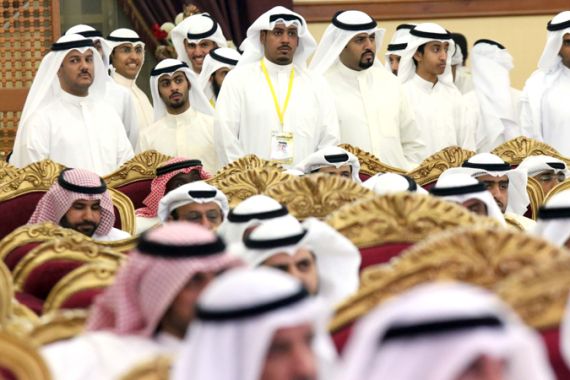Kuwait gears up for parliamentary elections
Electorate to use new voting system as Gulf nation readies for sixth parliamentary vote since 2006 on Saturday.

Kuwait holds an early parliamentary election on July 27 after the Gulf Arab state’s top court dissolved the previous assembly on a legal technicality.
Political parties are not allowed, so lawmakers form loose alliances based on policy, family and religious ties.
Some opposition politicians are boycotting the election in protest over changes to the voting system which were brought in last year.
Liberal, urban politicians are expected to fare well in the election. Many of them boycotted the last vote in December but have split with the larger opposition bloc this time because they want to run for parliament.
The main liberal group taking part is the National Democratic Alliance, which pushes for political and economic reform.
Influential tribes
Leaders of some of Kuwait’s most influential tribes, the Awazem, Ajman and Mutair, have also called for participation in the elections.
The groups, which have Bedouin roots and tend to be more socially conservative than the more urban populations, were among the tribes that boycotted the last election.
People with tribal origins are estimated to form slightly more than half of the electorate, so the opinion of such community leaders can be important.
After elections in February 2012, around 34 members of the 50-seat parliament formed a majority bloc. The group, which included Islamists, populists and liberals, boycotted the December 1 election. Now the liberals appear to have split from the group.
Most of the original bloc is expected to boycott the July 27 poll.
Some of the parties taking part in the elections include the Popular Action Bloc, a populist, nationalist group headed by former parliament speaker Ahmed al-Saadoun. It focuses on economic and social issues, but some members have strong tribal support.
Another party, the Islamic Constitutional Movement (Hadas), founded in the early 1990s, is affiliated with the Muslim Brotherhood. It backs a campaign to make Islamic law the source of legislation and has campaigned against corruption.
There is also the Salafi groups which are influenced by Saudi Arabia’s austere version of Islam.
The main Islamic Salafi Alliance opposed votes for women, who were granted suffrage in 2005. It has a smaller influence in political life than more moderate Islamists. Some members may run in this election.